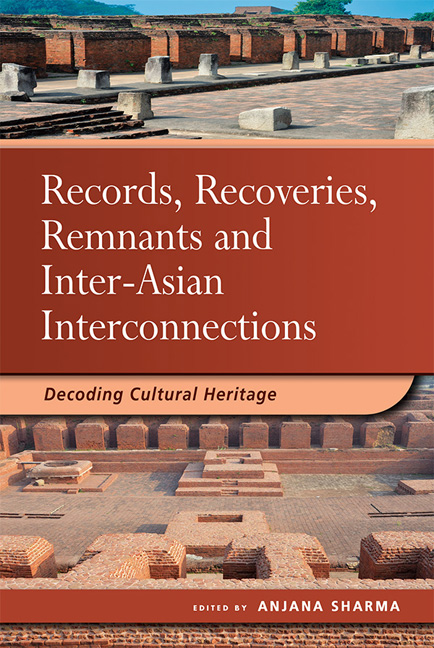Book contents
- Frontmatter
- Dedication
- Contents
- Contributors
- Acknowledgements
- 1 Introduction: Records, Recoveries, Remnants and Inter-Asian Interconnections — Decoding Cultural Heritage
- 2 Negotiating Place and Heritage: Creating Nalanda University
- 3 India, Magadha, Nalanda: Ecology and a Premodern World System
- 4 Collecting the Region: Configuring Bihar in the Space of Museums
- 5 Heritage Preservation in the Gaya Region
- 6 Setting the “Records” Straight: Textual Sources on Nālandā and Their Historical Value
- 7 “Central India Is What Is Called the Middle Kingdom”
- 8 The Object | The Tree: Emissaries of Buddhist Ground
- 9 Tracing Transregional Networks and Connections Across the Indic Manuscript Cultures of Nusantara (AD 1400–1600)
- 10 Seeking a Sufi Heritage in the Deccan
- 11 Archaeological Remains at Nalanda: A Spatial Comparison of Nineteenth Century Observations and the Protected World Heritage Site
- 12 A Heritage Gem Sits in the Heart of a City, Unacknowledged, Incognito: The Case for Recognizing Kolkata Chinatown as a Historic Urban Landscape
- Index
- Miscellaneous Endmatter
4 - Collecting the Region: Configuring Bihar in the Space of Museums
Published online by Cambridge University Press: 04 July 2018
- Frontmatter
- Dedication
- Contents
- Contributors
- Acknowledgements
- 1 Introduction: Records, Recoveries, Remnants and Inter-Asian Interconnections — Decoding Cultural Heritage
- 2 Negotiating Place and Heritage: Creating Nalanda University
- 3 India, Magadha, Nalanda: Ecology and a Premodern World System
- 4 Collecting the Region: Configuring Bihar in the Space of Museums
- 5 Heritage Preservation in the Gaya Region
- 6 Setting the “Records” Straight: Textual Sources on Nālandā and Their Historical Value
- 7 “Central India Is What Is Called the Middle Kingdom”
- 8 The Object | The Tree: Emissaries of Buddhist Ground
- 9 Tracing Transregional Networks and Connections Across the Indic Manuscript Cultures of Nusantara (AD 1400–1600)
- 10 Seeking a Sufi Heritage in the Deccan
- 11 Archaeological Remains at Nalanda: A Spatial Comparison of Nineteenth Century Observations and the Protected World Heritage Site
- 12 A Heritage Gem Sits in the Heart of a City, Unacknowledged, Incognito: The Case for Recognizing Kolkata Chinatown as a Historic Urban Landscape
- Index
- Miscellaneous Endmatter
Summary
“TURK, TELI, TAR, WEH TINO HAIN BIHAR”
Writing in 1870s Alexander Meyrick Broadley, an official of the colonial bureaucracy and an avid antiquarian, thus rounded up his account of exploits in Bihar — “Turks (Muhammadans), Telis (oil pressers), and Tar (Tar-palms), these three make up Bihar.” This configuration of Bihar, as Broadley persuasively argued, was a common parlance of the late nineteenth century. The choice of this particular phrase as the concluding sentence of his long essay on ancient Buddhist remains of the region, however, served a more crucial function than adding a bit of local colour to a standard nineteenth century regional history. It sought to bring out the labours of a colonial administrator and antiquarian in reclaiming the glorious pasts of a land now lost to vagaries of time, and to the all too familiar colonial charges against “uninformed native vandalism”, and “misappropriation”.
Framing nineteenth century Bihar as a land of wilderness, a region wrecked by lawlessness, and inhabited by natives with a disregard for their own past, enabled the colonial narratives of discovery of Bihar's ancient history. It is against these narratives of loss that colonial officials, archaeologists, and antiquarians like Broadley would stage their labours of recovering ancient pasts. In his capacity as the Assistant Magistrate of Bihar, Broadley conducted surveys, excavations, and built up a substantial antiquarian collection which found their way into the Bihar Museum established in the town of Bihar Sharif. As the earliest museum collection of nineteenth century colonial Bihar, the Broadley Collection emerged during 1870s and 1880s as the site of rediscovered ancient Buddhist Bihar protected from the ravages of “nature” and “natives”. However, this museum had a short life, spanning only some two decades.
In 1890s the Government of Bengal disbanded the Bihar Sharif Museum and transferred the antiquities to Calcutta to add to the imperial collection in the Indian Museum. In 1917, five years after the creation of the new province of Bihar and Orissa, a provincial museum was established in Patna, the new provincial capital. Citing instances of earlier carting away of antiquities outside the territorial limits of province, in which the disbanding of the Bihar Museum featured as a major grudge, the Patna Museum projected itself as the sole rightful repository of Bihar's antiquarian heritage. The institution emerged as a potent ground for the fashioning of a new provincial identity predicated on the reclamation of the province's history and antiquities.
- Type
- Chapter
- Information
- Records, Recoveries, Remnants and Inter-Asian InterconnectionsDecoding Cultural Heritage, pp. 70 - 85Publisher: ISEAS–Yusof Ishak InstitutePrint publication year: 2018



